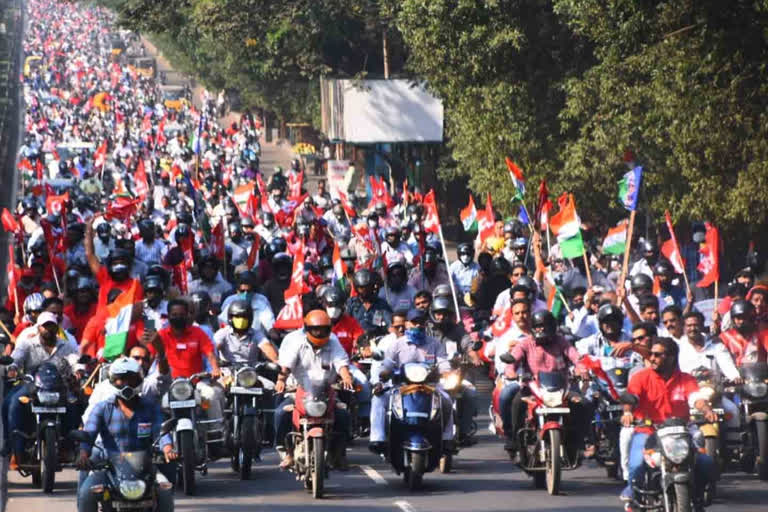Hyderabad: Five decades have passed since the foundation was laid for the Visakhapatnam Steel Plant, as a result of struggles and sacrifices made by the Telugu people during a protracted agitation for it. After overcoming several obstacles, the steel plant began production and was dedicated to the nation in 1992 by the then Prime Minister, PV Narasimha Rao.
The decision taken by the government to totally privatise the plant is difficult to digest. Visakhapatnam Steel plant is one of the Nava Ratna organisations among the Public Sector Units. Between 2002 and 2015, the plant helped both State and Central government earn an income of Rs 42,000 crore in different ways. The reasons behind the losses incurred by the organisation during the past three years, however, are not difficult to understand.
The decision to privatise the plant on that pretext came as a shock to the people. In the name of public interest, more than 22,000 acres of people's land was acquired by the government under the Land Acquisition Act, for the Steel Plant construction. The land was procured from farmers at a very cheap price. The highest price paid to the farmers at the time of acquisition was Rs 20,000 per acre. Today, the price of the same land has risen to more than Rs 5 crore per acre. In this backdrop, the Steel Plant is estimated to be valued more than Rs 2 lakh crore.
Visakhapatnam Steel Plant (VSP) is providing direct and indirect employment to more than one lakh people. Ironically, many promises made to the land evacuees at the time of plant construction are yet to be met. In order to be self-reliant, a steel plant should invariably own captive iron fields. The Ministry of Steel had announced in 2013 that it was ready to earmark Bayyaram iron ore mines of Khammam district to the Visakhapatnam Steel Plant. However, there has been no further action on the announcement till date.
Read: All-party protest against Vizag Steel Plant privatisation
The Central government stands accountable for the losses incurred by the Steel Plant as the plant is buying iron ore at an open market value of Rs 5,200 per tonne. Without captive and concessional iron fields, the steel plant cannot earn profits even if it is taken over by private operators. If the objectives of the National Steel Policy, announced in the year 2017, were to be achieved, the proposal to privatise the steel plant should be set aside and steps should be taken for the strengthening of the plant.
The national steel policy envisages to attain manufacturing capacity of 30 crore tons of steel with international quality and safety standards, towards developing India into a five trillion dollar economy. New life can be breathed into the public sector steel by utilising supplies from it for prestigious projects like Bharat Maala, Sagar Maala, Jal Jeevan Mission and Pradhan Mantri Awas Yojana. But is privatisation the only answer to all the problems of this sector?
The Centre is saying that it took recourse to privatisation on the basis of Niti Ayog recommendation. Has it not gone through the report submitted by Padmabhushan Saraswat in this connection? The report has clearly stated that while the actual cost of producing a ton of steel in India stands at USD 320 to 340, various impositions like taxes, cesses, exorbitant royalty rate (which is highest in the World), transportation costs, interest etc jack up the price to 420 USD per ton. When such is the case of steel plants having captive iron ore fields, one can understand the swim against the tide by the likes of VSP.
Read: JSPL output jumps 80 pc to 6.90 LT in Jan
The Modi government had in May 2017, decided that all the steel required for the infrastructure development shall be procured from public sector steel plants. Having taken such a decision, how can it privatise a Navaratna Steel Plant? It is alleged that the private steel plants with captive iron ore fields have turned into cartels to drastically increase steel prices. The Competition Commission is investigating into these allegations.
The Visakhapatnam Steel Plant is like a Kamadhenu (wish-fulfilling cow) in which faith should be invested. Selling it off instead of protecting it would deal a severe blow to national interests. Having already witnessed the consequences of privatising Hindustan Zinc Limited, the Telugu people are not ready to accept privatisation of the Visakhapatnam Steel Plant.



